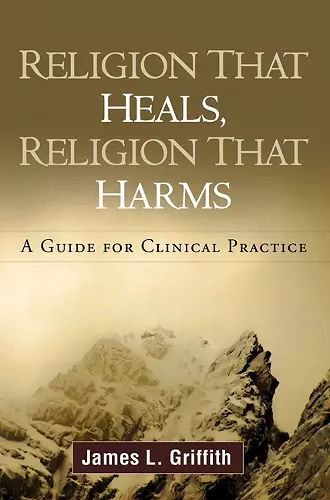Religion That Heals, Religion That Harms
A Guide for Clinical Practice
Format:Hardback
Publisher:Guilford Publications
Published:15th Oct '10
Currently unavailable, and unfortunately no date known when it will be back

From James L. Griffith, well known for his work on harnessing the healing potential of religion and spirituality, this book helps clinicians to intervene effectively in situations where religion is causing harm. Vivid examples illustrate how religious beliefs and practices may propel suicide, violence, self-neglect, or undue suffering in the face of medical or emotional challenges. Griffith also unravels the links between psychiatric illness and distorted religious experience. He demonstrates empathic, respectful ways to interview patients who disdain contact with mental health professionals, yet whose religious lives put themselves or others at risk. The book incorporates cutting-edge research on the psychology of religion and social neuroscience.
Exploring the shadow side of religion, Griffith is frank about the religious and political engagements that motivate his work, and passionate in his commitment to mental health care that fully engages our humanity. With great skill and creativity, he reveals how religious and spiritual dilemmas, when confronted with clarity and compassion, may hold the keys to positive transformation. This work is courageous, clear sighted, and essential.--Laurence J. Kirmayer, MD, James McGill Professor and Director, Division of Social and Transcultural Psychiatry, McGill University
This profound book reminds us that religion has been associated with not only the most impressive accomplishments of humankind, but also its darkest periods. Griffith provides a wealth of cross-cultural clinical examples in which religion serves as a foundation for psychopathology or self-harm. Yet he also explicates how personal spirituality and organized religion can provide paths towards recovery and equanimity. I highly recommend this book because of its philosophical depth, practicality, and uniqueness in the clinical realm. Griffith reminds clinicians of all faith orientations to give serious attention to our clients’ spirituality.--Barent W. Walsh, PhD, Executive Director, The Bridge of Central Massachusetts, Inc.
This is a wise book, carefully crafted by a psychiatrist who is well acquainted with the empirical literature on the psychology of religion. Griffith avoids both naive apologetics and reductionism in providing insights into how to work with what he terms religiously determined patients, including those whose beliefs are distant from one's own. No simple answers are provided; rather the reader is gradually pulled into the guiding thread of the entire text--the importance of maintaining a therapeutic stance of neighborly respect, even when beliefs may be linked to psychological crises and potentially destructive behaviors.--Ralph W. Hood, Jr., PhD, Department of Psychology, University of Tennessee at Chattanooga An important, original book on a topic we face daily, in both our professional and personal lives. With flowing prose, Griffith mines complex areas of research--sociobiology, neurobiology, and attachment theory chief among them--to make crucial distinctions among benign and destructive religious beliefs and practices. After reading this book, clinicians will feel better equipped to engage in meaningful dialogue with patients for whom distinguishing between symptoms of mental illness and 'troubling but nonetheless normal' religious ideas and behavior is essential. The book’s blend of conceptual and clinical case material, along with practical suggestions, will appeal to graduate students as well as seasoned clinicians. This is a wise and compassionate book that will be a lasting reference.--Kaethe Weingarten, PhD, Department of Psychiatry, Harvard Medical School; Director, The Witnessing Project - Griffith...delivers precisely what his book's title promises. This is a well-balanced guidebook for clinicians across health-related fields who treat what Griffith terms 'religiously determined' clients or patients. The author deftly uses sociobiology and neurobiology to generate an interpretive framework for contextualizing and accessing a wide range of factors that can influence the roles played by religion (and more broadly by spiritual orientation) in human lives, as well as their unanticipated and sometimes potentially problematic consequences. In addition to professional clinicians, Griffith's book would reward students of mystical traditions, including specialists in spiritual direction, psychology of religion scholars, and those interested in cross-cultural comparisons....Griffith's convenient single volume provides an apt integration of current thought concerning science and healing, is enriched by relevant stories derived from recent clinical experience, and can serve as a practical resource for all sorts of healers and helpers. Recommended. Lower-level undergraduates through professionals/practitioners; general readers. --Choice, 8/11/2010
ISBN: 9781606238899
Dimensions: unknown
Weight: 572g
274 pages